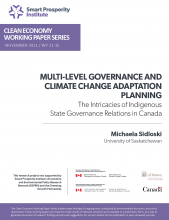Settler-colonial governance structures play a critical role in how climate change impacts are experienced by Indigenous Peoples, and can limit their ability to effectively respond to those impacts. Indigenous–state multi-level governance regimes offer some promise in furthering Indigenous self-determination in processes of environmental governance. To enhance the effectiveness of multi-level governance regimes while avoiding the reinforcement of colonial relations, institutions at both local and state levels must demonstrate responsibility, flexibility andresponsiveness, and contextualization in their approaches to climate change adaptation. An analysis of Canada’s recent federal climate plan reveals that Canadian state governance structures display significant room for improvement in enabling effective and durable multi-level governance regimes that support Indigenous self-determination in climate change decision-making.
The Clean Economy Working Paper Series disseminates findings of ongoing environmental andclean economy work conducted by researchers from a range of disciplines. These working papers are meant to make results of relevant scholarly work available in a preliminary form. Although these papers have not undergone a peer-review process, they meet general standards of scholarly excellence. The views expressed in these working papers are those of the authors and do not necessarily reflect the opinions of Smart Prosperity Institute.



